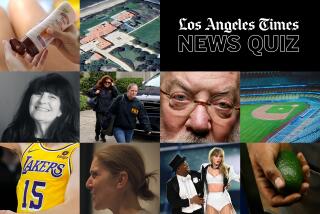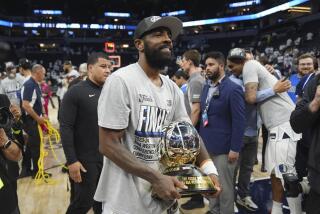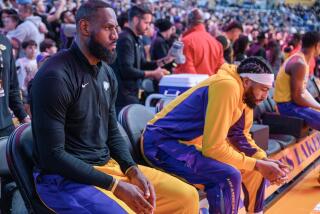Could Allen Iverson Help Us All Get Along?
- Share via
I was on my way to a meeting Thursday morning, completely oblivious to my surroundings, when I realized that the man in the car next to mine was speaking to me. “Lakers didn’t look so good last night,” he said.
I was startled. My principal human contact so far that day, with grown-ups at least, had been online. And I didn’t think of a stoplight on Olympic as a usual gathering place for conversation.
“But the 76ers looked great,” I finally managed to say. By the time the traffic light turned green we had come to an agreement that perhaps the 76ers upset victory in overtime Wednesday night was a needed wake-up call for the Lakers.
My 10-year-old daughter had led me to this conversation. I first watched Laker games to keep her company, only to find myself, by midseason, switching on ESPN during weekends when she was away. I tolerated the Laker flag she insisted we install on our car. It seemed decidedly unhip, but then we do such things for our children. Yet it was that yellow and purple flag that signaled to my traffic-stop companion that we had something in common.
A community unable to come together during the course of a divisive mayoral campaign suddenly has a focus that cuts across usual interest group lines. It is basketball.
I moved to L.A. with my daughter four years ago. Tired of small-town life in Iowa City, Iowa, I loved the anonymity of an urban environment. It quickly became clear, of course, that Los Angeles is not like other large cities. The bonds that can develop on a block in Manhattan or Chicago are elusive in Southern California’s car culture. We do get out of our cars sometimes, since not everything can be purchased online or at a drive-thru. But on those occasions, Los Angeles is the only city in the world I have been to where people wear their sunglasses when they go inside. It is as if eye contact over the cantaloupe is too intrusive.
But this city of the disconnected has finally been brought together. Allen Iverson has broken the ice. This inspiring, injured--and even short!--Most Valuable Player led the 76ers to victory, and upset the complacency of both the Laker team and its fans. Faced with a common challenge--Iverson--we finally have something in common with each other.
Will this cultural moment have any impact? It has certainly upset the expectations of peddlers of sports paraphernalia who hoped to make a profit selling brooms for an expected Laker sweep. Having given the rest of us something to talk about, will we continue to develop a sense of community long after Iverson has returned to Philadelphia?
Some scholars argue that meaningful social change can happen in moments of crisis, that advances in civil rights and social justice tend to grow out of a sense of common destiny forged in the response to a common threat. The 76ers, of course, will not unite Angelenos behind a common vision of social justice, or even help overcome the bitter aftertaste left by a mayoral victory achieved through negative campaigning. They surely won’t even lead my fellow shoppers to stash their shades in the grocery line.
Still, in giving us something to talk about, Iverson and his team have managed, even if fleetingly, to cut though barriers to community in Los Angeles. And that--even if 76er playoff upsets continue--may ultimately be their most stunning accomplishment of all.
More to Read
All things Lakers, all the time.
Get all the Lakers news you need in Dan Woike's weekly newsletter.
You may occasionally receive promotional content from the Los Angeles Times.








